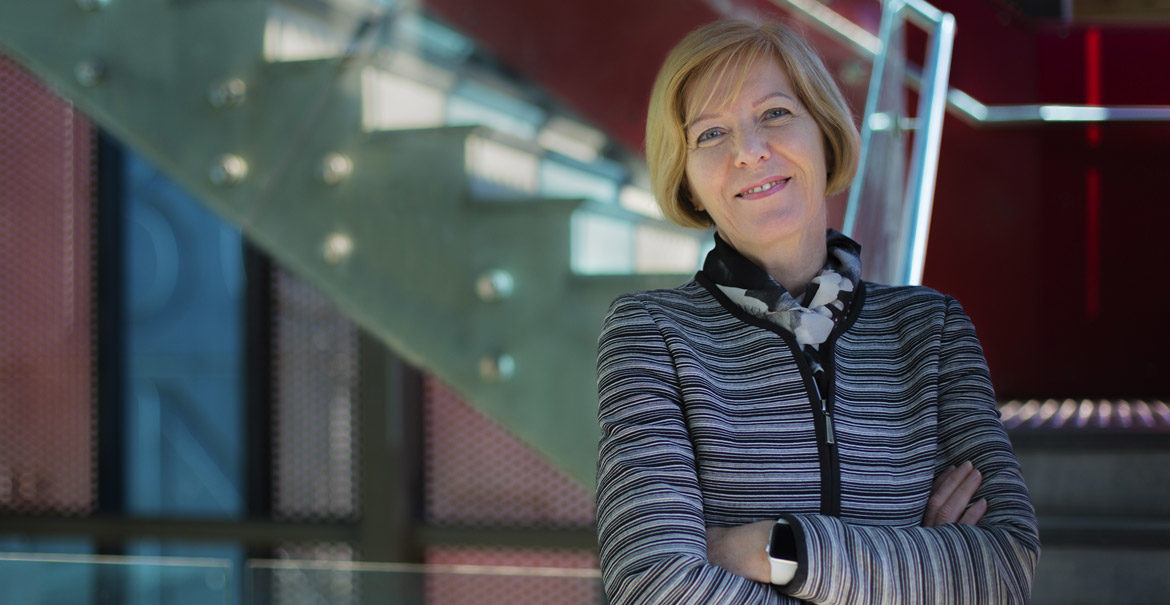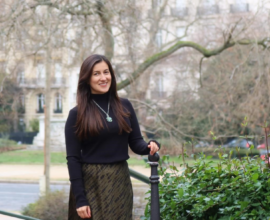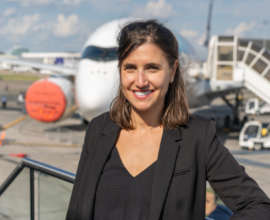Pascale Quester
![]() Reading Time: 11 minutes
Reading Time: 11 minutes
VICE-RECTRICE DE L’UNIVERSITÉ DE TECHNOLOGIE DE SWINBURNE
Quand nous pénétrons dans le salon de Pascale Quester à travers la caméra de son ordinateur portable, nous la trouvons entourée de cartons. Elle vient de quitter Adélaïde en Australie pour l’Université de technologie Swinburne à Melbourne, dont elle est désormais vice-rectrice. Pour quiconque ne serait pas au fait de la hiérarchie académique, elle est investie du poste le plus haut placé à l’université. Mais quelques semaines seulement après qu’elle ait accepté cette nomination, la pandémie a contraint le pays entier au confinement. Aujourd’hui, Pascale se retrouve ainsi à diriger une institution dont les amphithéâtres sont vides et dont le programme tout entier est désormais dispensé en ligne. « Composer avec un déficit de 50 millions de dollars ne faisait évidemment pas partie du mandat de départ ! Ni le fait de devoir diriger l’université depuis mon ordinateur à la maison… », révèle-t-elle avec un sourire de défi. Heureusement pour le personnel et pour les 57 000 étudiants, Pascale Quester refuse de se laisser miner par l’adversité, ce qui est caractéristique de sa personnalité.
Elle impute son ascension fulgurante à son cran. Elle a été élevée à Saint-Nazaire par des parents qui n’ont pas eu l’opportunité de terminer l’école et qui lui ont inculqué la valeur de la résilience. Elle a obtenu son diplôme à Audencia en terminant parmi les premières de la cohorte de 1985 à force d’une détermination farouche, tout en travaillant de nuit dans une institution pour adolescentes enceintes. Elle s’est découvert une passion pour le marketing et depuis, a gravi les échelons académiques en un temps record, passant de chargée de cours à professeur en l’espace de dix ans. Même si elle évolue dans un environnement qui n’est pas toujours accueillant envers les femmes investies de responsabilités, elle est devenue la première Française à occuper un poste de présidente d’université dans la région de l’Australasie. Elle est aujourd’hui reconnue comme l’une des chercheuses en comportement des consommateurs les plus réputées au monde. Elle fait partie des chercheuses françaises en marketing les plus publiées, avec trois manuels de référence sur le comportement des consommateurs à son actif. Croyant fermement que l’éducation a le pouvoir d’avoir un impact social, elle a reçu l’insigne de Chevalier de l’ordre national du Mérite en 2012, en reconnaissance de sa contribution à l’éducation supérieure, à la fois en France et en Australie.
Pascale Quester retrace pour nous les jalons les plus mémorables de sa carrière remarquable et nous donne quelques leçons de vie très utiles.
Pouvez-vous nous parler de vos origines familiales et des valeurs fondamentales que vos parents vous ont transmises ?
Il n’y a pas d’enseignant dans ma famille. En fait, avec ma sœur qui est chercheuse en médecine, nous sommes les premières de la famille à accéder à l’éducation supérieure. Mes parents étaient d’avis que l’éducation est un privilège qui doit être apprécié et mérité. Alors j’ai toujours fait des petits boulots d’été et du soir pour payer mes études. On ne m’a pas fait de largesses et je suis extrêmement reconnaissante de l’ancrage et de la résilience à l’état pur que cette éducation m’a apportés. J’ai essayé de répliquer ces principes en élevant mes propres enfants. Je ne pense pas avoir été dure avec elles, mais je réfute l’idée que le bonheur est un droit universel et que tout nous est dû.
Que vouliez-vous devenir quand vous étiez enfant ?
Je ne rêvais certainement pas de devenir vice-rectrice d’une université… parce que soyons clairs… aucun enfant ne rêve de ça ! La seule chose dont j’étais sûre en tant que jeune fille éduquée dans une école catholique à Saint-Nazaire, c’est que je voulais vivre dans un pays anglophone. Pour tout vous dire, pendant longtemps, chaque fois que j’allais en vacances, je faisais semblant d’être anglaise… au grand dam de ma mère ! Très jeune, j’ai eu les yeux tournés vers le reste du monde. L’une des raisons qui ont fait que j’ai trouvé Audencia si attractive, c’est que l’École offrait à tous les étudiants la possibilité d’étudier un semestre à l’étranger.
Vous êtes sortie d’Audencia avec des résultats hors normes. Vous avez réussi à réserver un peu de temps pour les activités extrascolaires et pour vous amuser ?
Eh bien, je n’avais tout simplement pas le luxe d’avoir du temps libre pour profiter des activités extrascolaires quand j’étais à l’École. Après le premier semestre, j’ai visé un mastère aux États-Unis et la seule possibilité pour moi de financer mon plan était d’obtenir les meilleures notes et de décrocher une bourse. En plus, je travaillais de nuit dans une institution pour adolescentes enceintes. Aider ces femmes à accoucher en deux heures maximum au beau milieu de la nuit et enchaîner sur un cours de comptabilité à 9 heures m’a donné une idée bien réelle de ce qu’est la vie ! Cette expérience m’a sans aucun doute appris à être opérationnelle en ayant peu dormi.
Comment est née votre fascination pour le marketing ?
À Audencia, j’ai définitivement trouvé réponse à mes questions. J’ai réalisé qu’un esprit scientifique et un intérêt pour Ia psyché des gens pouvaient aller de pair et trouver des applications dans la vie réelle. Le marketing, qui consiste à appliquer la science au comportement des consommateurs, a depuis toujours été mon dada. À l’université d’État de l’Ohio, où j’étudiais pour mon mastère en marketing, j’ai eu la chance de suivre les cours de Roger Blackwell, le père fondateur de la discipline et un maître de conférences phénoménal. Ensuite, je me suis spécialisée dans le mécénat et les effets du pays d’origine, mais le comportement des consommateurs reste le champ qui me passionne le plus.
Comment une jeune provinciale de l’Hexagone en arrive-t-elle à enseigner à l’autre bout du monde ?
À l’université de l’Ohio, l’un de mes professeurs m’a encouragée à rester faire un doctorat. Ma réponse, je cite, fut : « Je suis extrêmement flattée, mais la vie est trop courte pour passer encore trois hivers dans l’Ohio ! » Il se trouve qu’il était originaire de Nouvelle-Zélande et il m’a gentiment aidée à obtenir un poste de chargée de cours à l’université Massey, à Palmerston North, en Nouvelle-Zélande. Malheureusement, c’était en 1986 au moment de l’affaire du Rainbow Warrior, alors une Française (et fan de plongée !) n’était pas particulièrement bien vue pour demander un visa… Quand je l’ai obtenu des mois plus tard, j’ai eu un jour pour faire ma valise et dire au revoir à mes parents stupéfaits qui ne croyaient pas une seule seconde que je donnerais suite à ce plan impétueux. Dans l’avion minuscule d’Auckland à Palmerston North (la dernière étape d’un itinéraire qui durait plus de deux jours à l’époque), je me souviens d’avoir été émerveillée par la beauté des paysages… mais également de m’être sérieusement interrogée sur mon choix professionnel : j’allais atterrir dans un pays qui comptait 60 millions de moutons, mais seulement 3,5 millions d’habitants à ce moment-là (la taille de la ville de Columbus dans l’Ohio), et vivre dans une ville de 70 000 habitants (la taille du campus de l’université de l’Ohio). En définitive, j’ai passé là-bas cinq années incroyablement fructueuses, je suis devenue Kiwi et j’ai obtenu mon doctorat !
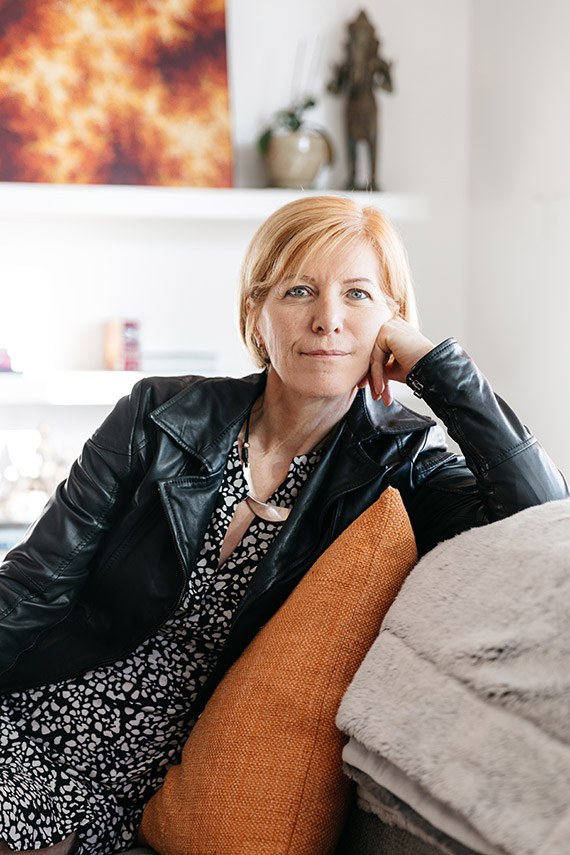
L’ascension progressive jusqu’au sommet de la hiérarchie universitaire était improbable pour une femme qui a commencé comme chargée de cours en marketing. Comment êtes-vous parvenue à gravir chaque échelon ?
J’avais mené une grande expérience risquée pour mon doctorat, essentiellement en faisant de la Nouvelle-Zélande mon laboratoire. En 1990, j’ai assisté à une conférence en Tasmanie afin de présenter mes résultats. Des représentants de l’université d’Adélaïde m’ont proposé un poste de chargée de cours plus important, que j’ai accepté sur le champ. Le marketing n’était pas très populaire à ce moment-là à Adélaïde et au départ, une vingtaine d’étudiants seulement s’étaient inscrits à mon cours. Mais en l’espace d’un mois, j’avais en face de moi 300 personnes à chaque cours. J’ai été promue maître de conférences au bout d’un an, ce qu’on peut généralement espérer après cinq ou six ans. J’ai compris que mon université accordait une grande importance à la recherche, alors j’ai redoublé d’efforts pour publier des articles, ce qui m’a valu d’être promue professeure associée en 1999. Plusieurs personnes ont été surprises, mais c’est le résultat d’un truc tout simple : comprendre les règles du jeu et être prêt à y jouer.
Ensuite, plusieurs personnes m’ont assuré que je ne serais jamais professeure, car le marketing n’était pas une discipline suffisamment sérieuse, et parce que les universités n’accordaient pas cette promotion au personnel interne, ils nommaient professeur des personnes de l’extérieur. J’ai décidé de leur donner tort. Mes manuels sont devenus une référence dans le domaine et en 2002 je suis devenue doyenne associée. J’ai pris une année sabbatique pour enseigner à la Sorbonne à Paris et en revenant, j’ai grimpé les échelons jusqu’à être nommée vice-rectrice adjointe en 2011. L’an dernier, après avoir candidaté pour la première fois de ma vie, on m’a proposé le poste de vice-rectrice à Swinburne, à Melbourne.
J’ai eu la chance tout au long de ma carrière de savoir repérer les portes entrouvertes et d’y glisser le pied au bon moment et dans la bonne direction. Je crois que les réussites professionnelles sont principalement une affaire de détermination, de compétences et de persévérance, mais il faut aussi une bonne dose de chance.
Avez-vous été confrontée au sexisme pendant votre carrière ?
Il y a vingt ans, le monde universitaire était encore un terrain d’exploration plutôt hostile aux femmes expérimentées. J’ai toujours été l’une des rares universitaires de sexe féminin dans mes établissements, alors en tant que représentante de la gent féminine, on m’a demandé maintes fois d’assister à des comités et j’ai abattu beaucoup de travail administratif supplémentaire. Quand j’ai adopté mes deux filles en Inde et que j’ai décidé de prendre un congé maternité à une période où ce n’était pas autorisé, je me suis retrouvée à jongler avec de nombreuses balles. J’ai travaillé avec des supérieurs qui avaient tous une approche différente de la direction des femmes. Certains étaient des défenseurs de la diversité des genres, d’autres ne faisaient aucun cas des questions de genre et d’autres encore, qui conservaient une mentalité machiste, se sentaient menacés face à une femme capable. Mais je suis résiliente et passionnée, et je trouve que l’humour est une arme efficace pour se faire entendre. Heureusement, j’ai découvert une merveilleuse culture ici à l’université Swinburne et mon équipe est très diversifiée sur tous les plans.
Est-ce que je me considère comme une féministe ? Je ne voudrais pas être promue ou félicitée parce que je suis une femme, mais je ne voudrais pas non plus être mal considérée parce que je suis une femme. Ça ne fait pas de moi une féministe, mais une personne qui sait pertinemment ce qui est juste et ce qui ne l’est pas.
Quelles seront les priorités de votre nouvelle fonction ?
La pandémie a entraîné des répercussions très prononcées sur le secteur de l’enseignement supérieur en Australie, car les étudiants internationaux, qui représentaient une part importante de nos effectifs, sont rentrés chez eux et que tous ne reviendront pas. Nous étions mieux préparés que la plupart des universités à la transition vers l’enseignement à distance, mais nous avons perdu cette avance maintenant que toutes les institutions s’y sont mises. Alors pour garantir la pérennité financière de l’entreprise, nous devons redresser notre modèle économique. Swinburne est une université de technologie qui s’est un peu généralisée et qui s’est trop dispersée. Mon objectif est de revenir à nos racines, d’orienter l’université vers un modèle plus centré et d’en faire un leader mondial dans les domaines des sciences, de la technologie, de l’ingénierie et des mathématiques. Il est possible que ce soit un peu traumatisant pour la communauté universitaire et que je ne sois pas très populaire au départ, mais je suis convaincue que c’est la voie vers l’excellence !
Où trouvez-vous de la satisfaction dans votre travail ?
Le fait d’avoir fait mes preuves dans le marketing m’offre une large palette d’opportunités. J’adore superviser les étudiants doctorants et je continue d’entretenir une relation presque maternante avec nombre d’entre eux – aujourd’hui, ils m’envoient des photos de leurs enfants ! Je suis accro à la recherche, alors je publie toujours. Et bien sûr, aujourd’hui j’expérimente l’aspect pratique du marketing, car étant vice-rectrice, je suis PDG d’une grande entreprise qui dépend de la solidité de sa marque, de la prestation de service et de la satisfaction de ses clients. Alors je ne m’ennuie pas !
Les universités sont les institutions les plus anciennes (avec les églises) et elles transcendent l’histoire, aucun doute là-dessus. Si vous voulez façonner le monde de demain, je ne vois pas de meilleur endroit. Leur contribution à la société est inestimable. Par exemple, en Australie, la population autochtone souffre de privations sociales tragiques. Leur espérance de vie est 30 ans plus courte que celle des populations non autochtones, et leur taux d’incarcération est cinq fois supérieur. Mais la recherche montre que quand de jeunes autochtones obtiennent une qualification équivalente dans l’enseignement supérieur, ce handicap social peut être gommé. Je suis résolue à combler ce fossé.
Quelle est votre plus grande fierté ?
À travers mes recherches, je suis devenue une fervente défenseure de la co-création, qui consiste à impliquer les consommateurs dans le processus de conception de nouveaux produits. J’ai décidé d’appliquer ce concept à la mise en place de nouveaux espaces d’apprentissage à l’université d’Adélaïde, en m’assurant que les étudiants soient consultés et qu’ils aient les moyens d’agir à chaque étape. Cela supposait de passer d’une attitude frontale à une collaboration plus positive avec les étudiants, notamment avec leur syndicat. Les gens pensaient que j’étais folle et de nombreuses personnes se sont d’abord opposées au projet, mais un an après l’inauguration de notre « Learning Hub », les étudiants passent plus de temps sur le campus et les taux de rétention et de réussite sont plus élevés. Aujourd’hui, des personnes viennent de tous les coins du pays et d’Asie pour visiter le Hub et l’admirer comme un modèle de ce que la co-création peut accomplir. Je suis fière d’avoir instillé un changement de culture dans la façon dont la direction et les étudiants peuvent travailler main dans la main.
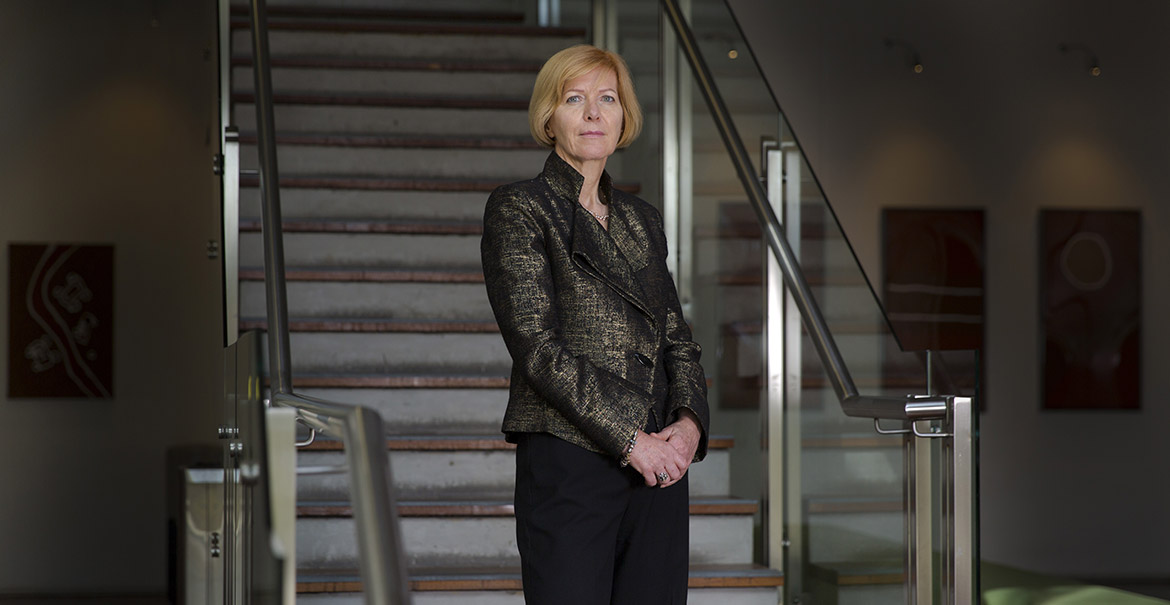
Quand on est aussi passionné par son travail, est-il difficile de trouver un équilibre et de la satisfaction dans les autres aspects de sa vie ?
Quand on embrasse une carrière académique, on apprend à tirer un trait sur la capacité à décrocher. Votre cerveau réfléchit constamment à vos idées de recherche et à la façon dont vous pouvez les faire avancer. C’est sans doute le prix à payer pour être passionnée. Mais ce n’est pas un sacrifice, parce que je n’ai jamais l’impression de travailler. J’ai fait le choix mûrement réfléchi et décomplexé de me concentrer sur mon travail et certaines de mes précédentes relations n’y ont pas survécu. Aujourd’hui, je suis très heureuse avec un partenaire qui a eu la générosité de me suivre à Melbourne. J’ai eu la chance d’adopter deux petites filles en Inde, Maya en 1998 et Nalini en 2002. Elles me reprochent parfois d’avoir été « la mère qui n’était jamais là » pour les concerts à l’école et les manifestations sportives. Mais je ne me suis jamais engagée à être une mère parfaite. Et je leur rappelle qu’elles doivent apprécier les autres opportunités que je leur apporte, comme l’accès aux voyages et à une culture riche. Le fait d’avoir une vie bien remplie ne m’a pas empêchée d’être proche de mes filles, alors j’ai décidé très tôt de déculpabiliser… malgré mon éducation catholique ! Mon seul regret, c’est de ne pas m’être arrêtée plus souvent pour les regarder grandir, pour faire le point et profiter de l’instant présent au lieu de courir en permanence après mon prochain projet.
Quels sont les idées préconçues les plus répandues à propos du travail en Australie que vous aimeriez démentir ou confirmer ?
L’Australie et la Nouvelle-Zélande sont auréolées de ce mythe de l’aventure, elles représentent la « nouvelle frontière ». Les gens fantasment sur les kangourous dans le bush et sur l’Outback. Pourtant, 95 % de la population vit à moins de 10 km de la côte, alors c’est très majoritairement une société urbaine. Ce que je peux confirmer sans sourciller, c’est que si vous vivez en Australie et que votre statut social est important pour vous, il vaut mieux être footballeur qu’universitaire ! Le sport est une obsession nationale : on ne voit jamais les Australiens vivre une passion collective, sauf à un match de football.
Quel message aimeriez-vous faire passer aux étudiants qui sortiront diplômés d’Audencia cette année ?
Avec les perturbations massives et durables liées à la COVID-19, on risque de voir toute une génération d’étudiants qui se sentiront victimes de la conjoncture. Le conseil que je pourrais leur donner, c’est : « Acceptez la situation, ne la déplorez pas, n’accusez personne. C’est votre norme, c’est votre histoire, tirez-en le meilleur parti. Vous êtes à la place du conducteur, lancez-vous et faites quelque chose d’extraordinaire ! »
Où vous voyez-vous dans cinq ans ?
J’aimerais bien partager mon temps entre Paris et l’île Kangourou, un lieu fabuleux près de la côte d’Adélaïde sur laquelle je construis actuellement une maison sans connexion au réseau.
Avez-vous des plans pour le week-end ?
Eh bien, je suis toujours entourée d’une pile de cartons à déballer, alors je vais rester à la maison. Comme Melbourne est toujours confinée, je vais encore faire le tour du parc avec mon chien et regarder quelque chose sur Netflix. Je viens de terminer Le Bureau et La Casa de Papel, et là, je suis en plein dans Homeland et l’inévitable Game of Thrones (qui m’a rappelé quelques scènes de la vie politique à l’université !)… les meilleurs antidotes au blues du confinement si vous voulez mon avis !
